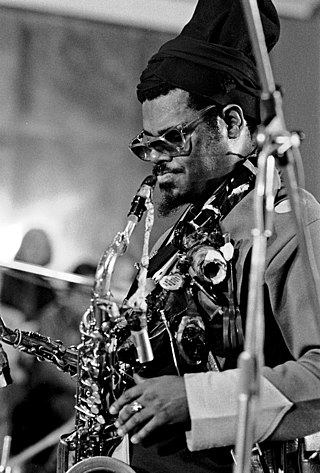
Rahsaan Roland Kirk, known earlier in his career simply as Roland Kirk, was an American jazz multi-instrumentalist who played tenor saxophone, flute, and many other instruments. He was renowned for his onstage vitality, during which virtuoso improvisation was accompanied by comic banter, political ranting, and the ability to play several instruments simultaneously.
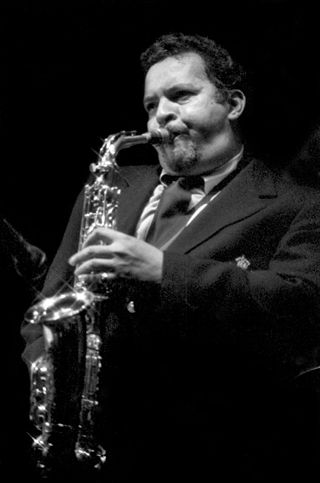
John Lenwood McLean was an American jazz alto saxophonist, composer, bandleader, and educator. He is one of the few musicians to be elected to the DownBeat Hall of Fame in the year of their death.
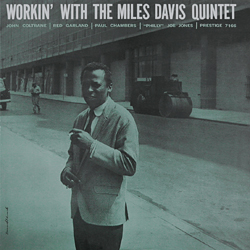
Workin' with the Miles Davis Quintet is an album by the Miles Davis Quintet which was released c. January 1960 through Prestige Records. It was recorded in two sessions on May 11 and October 26, 1956, that produced four albums: this one, Relaxin' with the Miles Davis Quintet, Steamin' with the Miles Davis Quintet and Cookin' with the Miles Davis Quintet.

Monk's Music is a jazz album by the Thelonious Monk Septet, which for this recording included Coleman Hawkins and John Coltrane. It was released in November 1957 through Riverside Records. The recording was made in New York City on June 26, 1957.

Coltrane Plays the Blues is an album of music by the jazz musician John Coltrane. It was released in July 1962 by Atlantic Records. It was recorded at Atlantic Studios during the sessions for My Favorite Things, assembled after Coltrane had stopped recording for the label and was under contract to Impulse Records. Like Prestige Records before them, as Coltrane's fame grew during the 1960s, Atlantic used unissued recordings and released them without either Coltrane's input or approval.

Oh Yeah is a studio album by the American jazz musician and composer Charles Mingus. It was released in April 1962 through Atlantic Records. It was recorded in 1961, and features Mingus playing piano rather than his usual upright bass, and also singing on three songs.

Change of the Century is a studio album by jazz saxophonist Ornette Coleman. It was released through Atlantic Records in May 1960. It sold very well from soon after its release. Recording sessions for the album took place on October 8 and 9, 1959, in New York City.

Domino is an album by American jazz saxophonist Roland Kirk, released on Mercury Records in November 1962. It was reissued in 2000 on Verve with bonus tracks featuring sessions with Herbie Hancock. It includes Kirk's tribute to Thelonious Monk and Charles Mingus, "Where Monk and Mingus Live", in a medley with the former's "Let's Call This".

Coltrane Jazz is a studio album by the jazz musician John Coltrane. It was released in early 1961 on Atlantic Records. Most of the album features Coltrane playing with his former Miles Davis bandmates, pianist Wynton Kelly, bassist Paul Chambers and drummer Jimmy Cobb during two sessions in November and December, 1959. The exception is the track "Village Blues", which was recorded October 21, 1960. "Village Blues" comes from the first recording session featuring Coltrane playing with pianist McCoy Tyner and drummer Elvin Jones, who toured and recorded with Coltrane as part of his celebrated "classic quartet" from 1960 to 1965.

Out of the Afternoon is an album by jazz drummer Roy Haynes, released in the summer of 1962 on Impulse! Records. It features multi-instrumentalist Roland Kirk among the musicians in Haynes' quartet.

A Modern Jazz Symposium of Music and Poetry is an album by the jazz bassist, composer, and band leader Charles Mingus, released by Bethlehem Records in mid-1959. In spite of the title, the album does not contain any poetry. "Scenes in the City", however, includes narration performed by Mel Stewart and written by actor Lonne Elder with assistance from Langston Hughes. The composition "Duke's Choice" re-appears, in updated form, as "I X Love" on the 1963 album Mingus Mingus Mingus Mingus Mingus. "Nouroog", "Duke's Choice" and "Slippers" form the basis of the suite "Open Letter to Duke" on Mingus Ah Um.
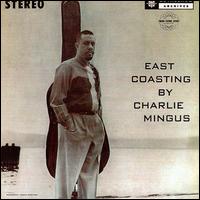
East Coasting is an album by Charles Mingus, recorded and released in late 1957. It was reissued on CD with bonus takes in 1993.
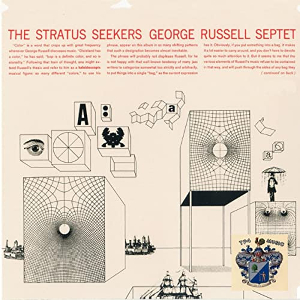
The Stratus Seekers is an album by George Russell released in May or June 1962 on Riverside Records. The album contains performances by Russell with John Pierce, David Baker, Paul Plummer, Don Ellis, Steve Swallow and Joe Hunt.

The Roland Kirk Quartet Meets the Benny Golson Orchestra is an album by jazz multi-instrumentalist Roland Kirk. It was originally released on the Mercury label in November 1963 and contains performances by Kirk's Quartet and Benny Golson's Orchestra.

Dog Years in the Fourth Ring is a compilation album by jazz multi-instrumentalist Rahsaan Roland Kirk featuring 2 CDs of previously unreleased live performances and Kirk's solo album Natural Black Inventions: Root Strata on the third disc. It was released on the 32 Jazz label in 1997.

Ornette! is a studio album by the alto saxophonist and composer Ornette Coleman. It was released in February 1962 through Atlantic Records. The album features Scott LaFaro in place of Charlie Haden, who had left the Quartet but would work again with Coleman in the future.

Pre-Bird is an album by jazz bassist and composer Charles Mingus consisting of music that was composed before Mingus first heard Charlie Parker, hence the title Pre-Bird. It was released on Mercury Records in September 1961.
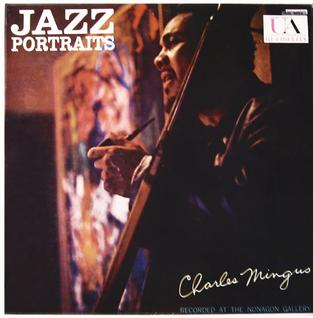
Jazz Portraits: Mingus in Wonderland is a live album by jazz bassist and composer Charles Mingus, recorded in 1959 and released on the United Artists label in September of that year. The original release was titled Jazz Portraits, and a subsequent edition was titled Wonderland, leading to the combined title of Jazz Portraits: Mingus in Wonderland.
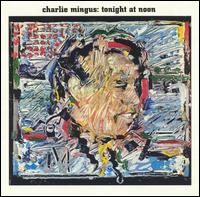
Tonight at Noon is an album of music by the jazz bassist and composer Charles Mingus. It was released through Atlantic Records in July 1964. It compiles tracks recorded at two sessions – the 1957 sessions for the album entitled The Clown and the 1961 sessions for Oh Yeah. These tracks have since been added to the CD re-releases of their respective albums as bonus tracks.

Screamin' the Blues is an album by American saxophonist Oliver Nelson, originally released in 1961 on New Jazz Records.




















